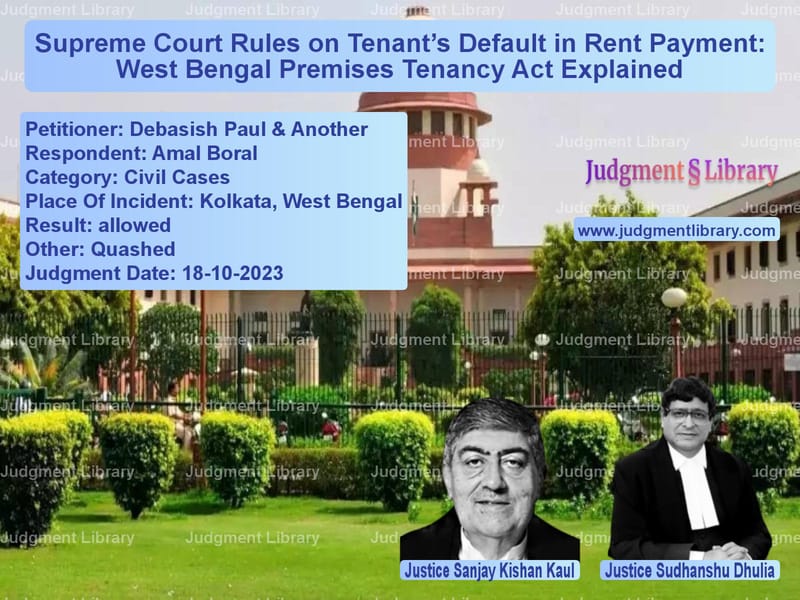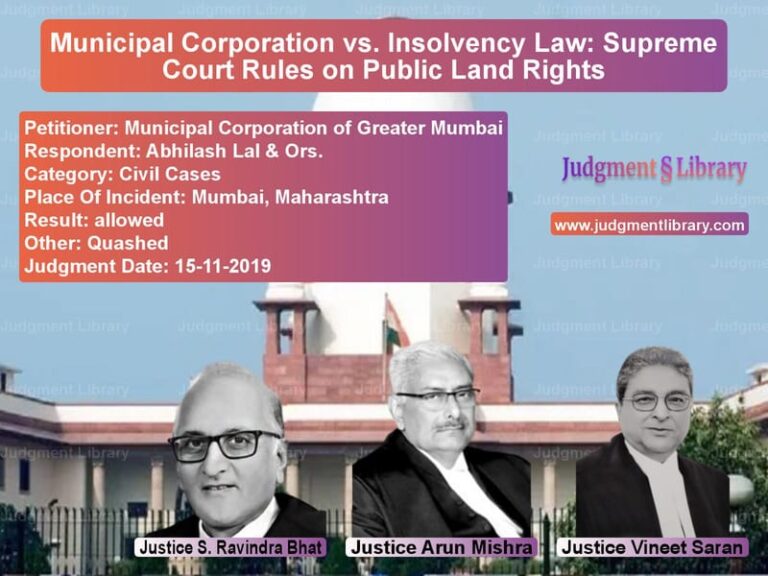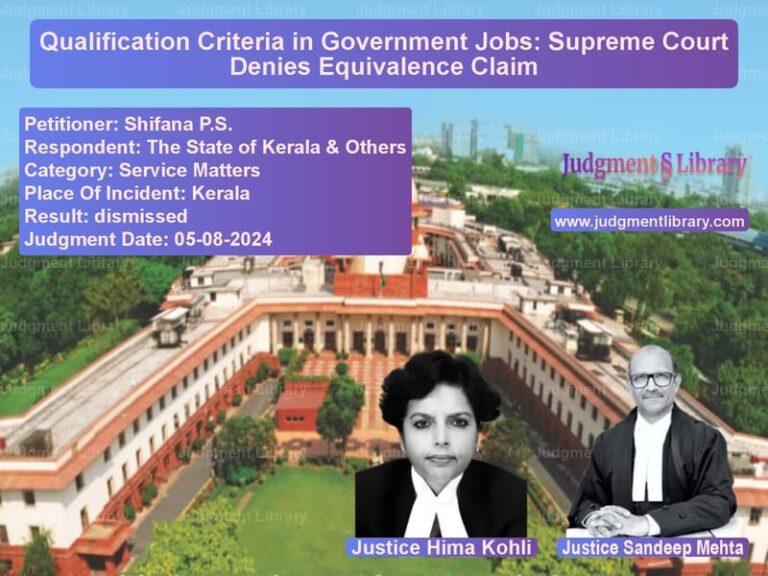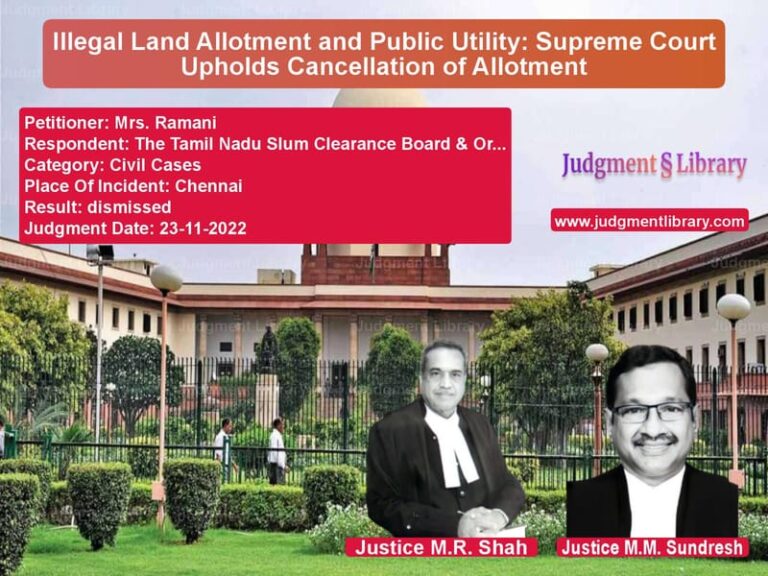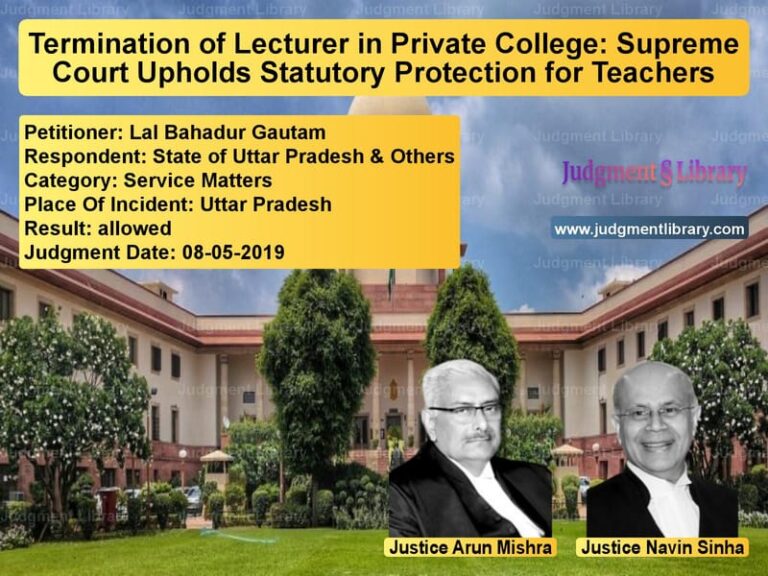Supreme Court Rules on Tenant’s Default in Rent Payment: West Bengal Premises Tenancy Act Explained
The Supreme Court of India recently adjudicated the case of Debasish Paul & Another vs. Amal Boral, which revolved around a long-standing dispute between a landlord and a tenant over non-payment of rent under the West Bengal Premises Tenancy Act, 1997. The case highlighted key legal principles, including the role of statutory timelines, the applicability of the Limitation Act, 1963, and the rights of landlords to seek eviction due to non-payment of rent.
Background of the Case
The dispute arose when the respondent-tenant allegedly stopped paying rent for shop No. AC 249, Rabindrapally, Krishnapur, Kolkata, which he occupied under the appellants (landlords). The rent was fixed at ₹352 per month, but payments reportedly ceased from February 2005. The landlords served a notice on 31st October 2013 to vacate the premises due to non-payment and subsequently filed an eviction suit (Title Suit No. 667/2013).
During the proceedings, the tenant filed an application under Sections 7(1) and 7(2) of the West Bengal Premises Tenancy Act, 1997, seeking protection from eviction by depositing arrears of rent. However, the trial court rejected the application, citing the tenant’s delay of ten months in filing the request after entering an appearance in the suit on 9th February 2016. No application for condonation of delay was filed under Section 5 of the Limitation Act, 1963.
High Court Ruling
The tenant challenged the trial court’s decision in a Civil Revision Petition before the Calcutta High Court. On 21st August 2019, the High Court:
- Set aside the trial court’s rejection of the application.
- Allowed the tenant to file an application under Section 5 of the Limitation Act, explaining the delay.
- Directed the trial court to dispose of the application promptly.
The High Court accepted the tenant’s argument that his advocate had incorrectly advised him that no steps were required due to a stay order in C.O. No. 233/2006. When the tenant became aware of the error, he filed a written statement along with his application, which was subsequently rejected by the trial court.
Supreme Court’s Review and Key Legal Issues
The Supreme Court granted leave to appeal and examined several important legal questions:
- Whether the High Court correctly applied Section 5 of the Limitation Act, 1963, to condone the delay in the tenant’s application.
- Whether a tenant who fails to deposit rent within the statutory period loses the protection provided under the West Bengal Premises Tenancy Act, 1997.
- Whether non-payment of rent for over 142 months justified eviction.
Key Provisions of the Law
The judgment analyzed relevant statutory provisions:
- Section 7 of the West Bengal Premises Tenancy Act, 1997: Mandates that a tenant must deposit arrears of rent within one month of service of summons to claim protection from eviction.
- Section 40 of the West Bengal Premises Tenancy Act, 1997: States that the Limitation Act applies to proceedings under the Tenancy Act, subject to specific limitations.
- Section 5 of the Limitation Act, 1963: Allows courts to condone delays in filing applications if sufficient cause is shown.
Arguments Presented
Landlord’s Arguments:
- The tenant failed to comply with statutory requirements by not depositing rent within the stipulated time.
- Under Section 7(1) of the Tenancy Act, the tenant had a fixed period to make payments, which he ignored.
- Section 5 of the Limitation Act should not override specific statutory deadlines prescribed in the Tenancy Act.
- The tenant’s claim of “wrong legal advice” should not be accepted as an excuse for prolonged default.
Tenant’s Arguments:
- The delay was due to incorrect legal advice, which constituted “sufficient cause” under Section 5 of the Limitation Act.
- Since the Limitation Act applies to tenancy proceedings via Section 40, the delay should be condoned.
- The tenant had eventually filed the required application, though late, and should be allowed to retain possession.
Supreme Court’s Findings
The Supreme Court ruled in favor of the landlords, making the following key observations:
- Failure to Deposit Rent Within Time Is Fatal: The court emphasized that a tenant who does not deposit arrears within the prescribed period loses protection against eviction.
- Limitation Act Cannot Override Specific Tenancy Provisions: While Section 40 of the Tenancy Act allows for the application of the Limitation Act, it does not extend statutory deadlines set under Section 7.
- Tenant’s Non-Payment for 142 Months Was Unjustified: The tenant had defaulted for over a decade without valid justification.
- Legal Advice Cannot Excuse Non-Compliance: Accepting incorrect legal advice as a justification would set a dangerous precedent, allowing tenants to indefinitely delay rent payments.
Final Judgment and Implications
- The Supreme Court set aside the High Court’s ruling.
- The trial court’s rejection of the tenant’s application was upheld.
- The tenant was ordered to vacate the premises.
- Costs were awarded in favor of the landlords.
Impact of the Judgment
This ruling has far-reaching consequences for landlord-tenant disputes:
- Strict Enforcement of Rent Deposits: Tenants must comply with statutory deadlines to avoid eviction.
- Limited Scope for Delay Condonation: Courts will not condone delays unless extraordinary circumstances exist.
- Protection of Landlord Rights: Ensures that landlords can reclaim property when tenants default for prolonged periods.
- Precedent Against Tenant Abuses: Deters tenants from exploiting legal loopholes to delay eviction.
Conclusion
The Supreme Court’s ruling in Debasish Paul & Another vs. Amal Boral reinforces that statutory timelines must be adhered to in tenancy disputes. The judgment underscores that non-payment of rent beyond permissible limits cannot be excused merely due to legal oversight. Landlords now have a stronger legal foundation to reclaim property in cases of prolonged tenant default.
Petitioner Name: Debasish Paul & Another.Respondent Name: Amal Boral.Judgment By: Justice Sanjay Kishan Kaul, Justice Sudhanshu Dhulia.Place Of Incident: Kolkata, West Bengal.Judgment Date: 18-10-2023.
Don’t miss out on the full details! Download the complete judgment in PDF format below and gain valuable insights instantly!
Download Judgment: debasish-paul-&-anot-vs-amal-boral-supreme-court-of-india-judgment-dated-18-10-2023.pdf
Directly Download Judgment: Directly download this Judgment
See all petitions in Property Disputes
See all petitions in Landlord-Tenant Disputes
See all petitions in Judgment by Sanjay Kishan Kaul
See all petitions in Judgment by Sudhanshu Dhulia
See all petitions in allowed
See all petitions in Quashed
See all petitions in supreme court of India judgments October 2023
See all petitions in 2023 judgments
See all posts in Civil Cases Category
See all allowed petitions in Civil Cases Category
See all Dismissed petitions in Civil Cases Category
See all partially allowed petitions in Civil Cases Category

